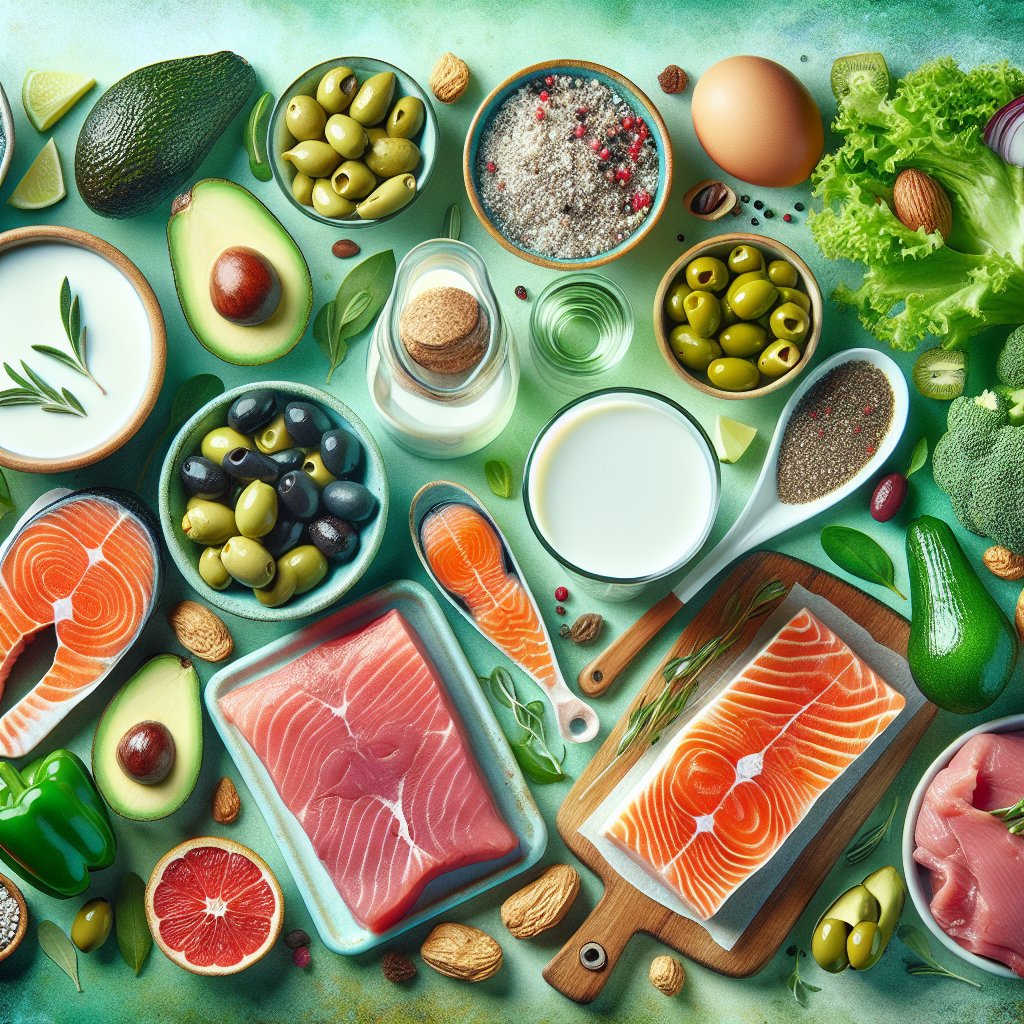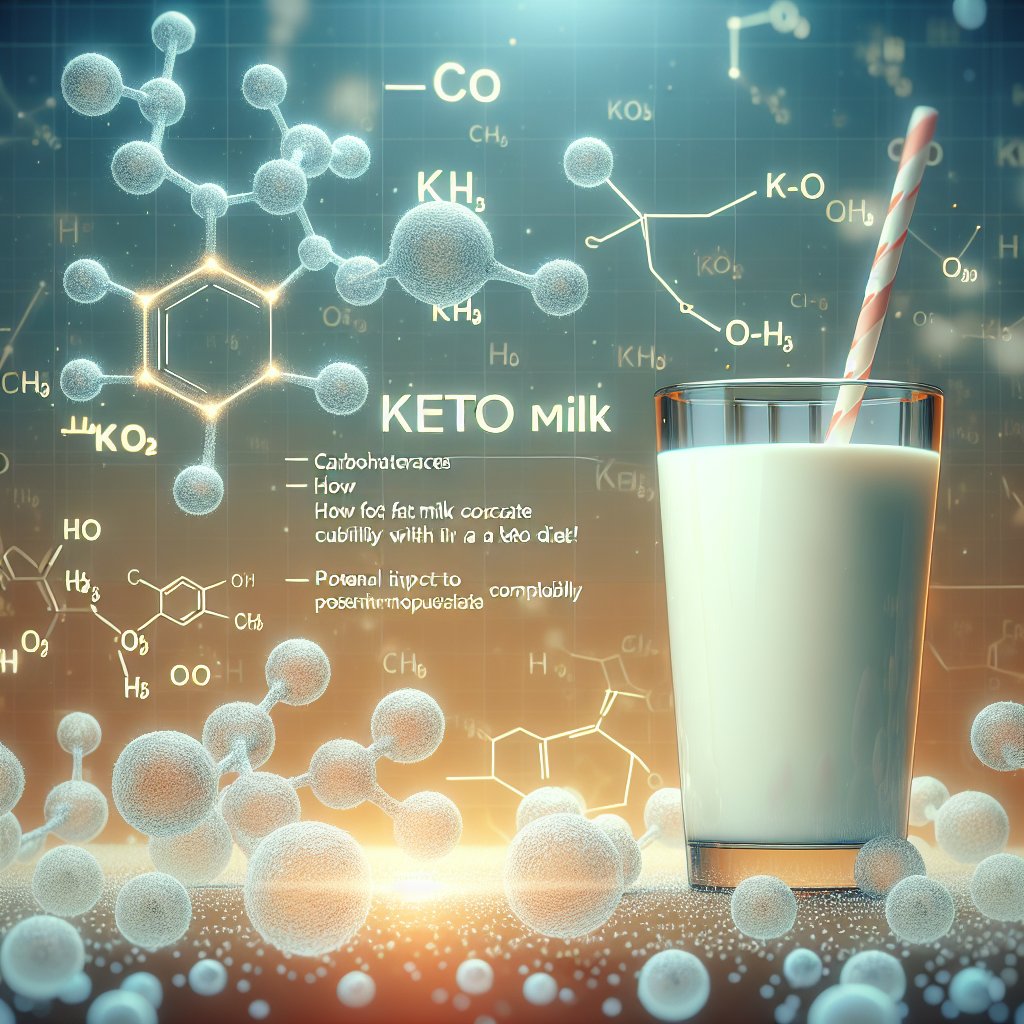Is Low Fat Milk Keto Friendly? Exploring its Compatibility with the Popular Keto Diet Craze!
Understanding the Keto Diet and the Rise of Low-Carb, High-Fat Choices
Hey there, fellow health enthusiasts! Today, we’re diving into the world of the ketogenic diet, a very hot topic that’s been taking the health and wellness scene by storm. You’ve probably heard all about the amazing success stories of people shedding extra pounds, feeling more energized, and experiencing various health benefits thanks to the keto lifestyle. But what’s the buzz all about, and why the obsession with low-carb, high-fat food choices?
First things first, let’s address the question on everyone’s mind: is low-fat milk keto-friendly? We’ll get to that soon, but before we do, it’s crucial to understand why the keto diet has gained such massive popularity. The ketogenic diet is a high-fat, low-carbohydrate eating plan that has been shown to offer a myriad of benefits, including weight loss, improved mental focus, and enhanced energy levels.
Studies have suggested that following a ketogenic diet can lead to reduced hunger and increased fat burning, making it an appealing choice for those looking to manage their weight effectively. Furthermore, research published in the Journal of Physiology & Behavior highlighted that the keto diet may even have a positive impact on mental health and cognitive function.
So, why the focus on low-carb, high-fat food choices? This approach is designed to shift the body’s primary fuel source from carbohydrates to fats, putting the body in a state of ketosis, where it burns fat for energy. As a result, many individuals have turned to delicious, fat-rich foods like avocados, nuts, and coconut oil as staples in their keto meal plans. But where does low-fat milk fit into this high-fat equation? Let’s uncover the truth!

What is the Keto Diet?
Before we dive into the role of low-fat milk in the keto diet, let’s briefly define what the keto diet is all about. The keto diet, short for ketogenic diet, is a high-fat, low-carbohydrate eating plan that has gained popularity for its potential health benefits, including weight loss and improved blood sugar control.
The primary goal of the keto diet is to achieve a metabolic state called ketosis. In ketosis, the body switches its fuel source from carbohydrates to fat, leading to the production of molecules called ketones, which are used for energy. This shift in metabolism is believed to have various health benefits, and is the cornerstone of the keto diet.
Low Fat Milk Overview
What is Low-Fat Milk?
Low-fat milk, also known as reduced-fat milk, is a popular dairy product that has had some or all of the cream removed. This results in a lower fat content compared to whole milk, making it a lighter and healthier alternative.
Nutritional Content
Low-fat milk is a rich source of essential nutrients that are beneficial for overall health. A standard cup (240 ml) of low-fat milk contains around 100 calories, 2-5 grams of fat, 8 grams of protein, and 12 grams of carbohydrates. It’s also fortified with vitamins A and D, as well as calcium and other minerals.
Additionally, low-fat milk is a great source of high-quality protein, which is essential for muscle repair and growth, as well as for maintaining healthy skin and hair. The presence of calcium and vitamin D promotes strong bones and teeth, making low-fat milk an important part of a balanced diet.
Compared to whole milk, low-fat milk is lower in saturated fat and calories, making it a healthier choice for individuals looking to reduce their overall fat intake while still enjoying the benefits of dairy.

Low Fat Milk and the Keto Diet
Is low fat milk keto friendly? Let’s dive into this popular topic and explore its compatibility with the ketogenic diet craze.
While the keto diet typically advocates for high-fat foods and restricts carbohydrates, the concept of “keto friendly” can be quite nuanced. When it comes to dairy products like milk, the macronutrient composition is a crucial factor to consider. Low fat milk is generally lower in carbohydrates and higher in protein than whole milk, making it a potential option for those following the keto lifestyle.
Research published in the Journal of Nutrition indicates that low fat dairy consumption is associated with a reduced risk of developing metabolic syndrome, a condition often linked to insulin resistance and obesity. This suggests that incorporating low fat dairy such as milk into a keto meal plan can offer potential health benefits while aligning with the diet’s principles.
It’s important to note that individual responses to dairy products can vary. Some people may find that moderate consumption of low fat milk fits well within their daily carbohydrate limits, while others may prefer to opt for higher fat dairy choices. Ultimately, the compatibility of low fat milk with the keto diet hinges on personal tolerance and macro goals.
Detailing the Carbohydrate Content in Low Fat Milk
When considering the ketogenic diet, one of the key factors to keep in mind is the carbohydrate content of the foods and drinks you consume. Low-fat milk, a staple in many households, contains carbohydrates that can impact ketosis.
A standard serving of low-fat milk, which is one cup (240 ml), contains around 12 grams of carbohydrates. The carbs present are primarily in the form of lactose, a natural sugar found in milk. While this might seem high for those aiming to stay within a low-carb threshold on a keto diet, it’s essential to consider the overall daily carbohydrate intake rather than focusing solely on a single food item.
It’s important to note that for some individuals, including low-fat milk in their keto diet may still allow them to remain in ketosis, especially if they are within their daily carb limits. The key is moderation and mindful consumption.
Understanding the carbohydrate count in low-fat milk allows for better meal planning and enables individuals to make informed choices. It’s also worth noting that for those who may wish to include low-fat milk in their keto lifestyle, there are other low-carb milk alternatives, such as almond milk or coconut milk, that can be considered as well.
In the next sections, we’ll explore the potential impact of low-fat milk consumption on ketosis and discuss practical tips for incorporating it into a keto diet.

Nutritional Comparison
When it comes to milk options on a keto diet, it’s essential to be mindful of the nutritional value. Let’s compare the macros of low-fat milk with other milk options to see which is the most keto-friendly.
Low-Fat Milk
Low-fat milk contains approximately 12 grams of carbohydrates per one cup (240 mL) serving, making it slightly higher in carbs compared to whole milk. However, it is lower in fat, with only 2.5 grams of fat per serving. The protein content is the same as whole milk, at about 8 grams per serving. While low-fat milk is not as low in carbs as some other milk alternatives, it can still fit into a well-planned keto diet in moderation.
Other Milk Options
Almond milk and coconut milk are popular low-carb, keto-friendly milk substitutes. Unsweetened almond milk contains as little as 1-2 grams of carbohydrates per serving, making it a great choice for those on a keto diet. Coconut milk is also relatively low in carbs, with around 3 grams per serving. Both of these options are higher in healthy fats, making them more keto-friendly than low-fat milk.
Ultimately, when considering the compatibility of low-fat milk with the keto diet, it’s important to pay attention to its carb content and consider other low-carb milk alternatives that may better align with keto dietary goals.
Alternatives to Low Fat Milk
When it comes to the ketogenic diet, traditional low-fat milk may not be the best option due to its higher carbohydrate content. But fear not, there are plenty of delicious alternative milk options that are more suitable for a keto lifestyle!
1. Almond Milk
Almond milk is a popular choice for those following a keto diet. It is low in carbohydrates and can be easily incorporated into your daily routine. Research has shown that almond milk may help in reducing the risk of heart disease and improving overall heart health1.
2. Coconut Milk
Coconut milk is another excellent choice for the keto diet. It contains healthy fats that can help keep you feeling full and satisfied. Studies have also suggested that the medium-chain triglycerides (MCTs) found in coconut milk may have a positive impact on weight management2.
3. Flaxseed Milk
Flaxseed milk is a lesser-known but nutrient-dense option. It is rich in omega-3 fatty acids and has been linked to potential benefits such as improved cholesterol levels and reduced inflammation3.
So, if you’re considering alternatives to low-fat milk on a keto diet, these options can be fantastic substitutes that not only align with the principles of the diet but also offer various health benefits!
Remember, always check the labels for added sugars and hidden carbohydrates when selecting alternative milk options to ensure they truly align with your keto goals.
1 Source: “Almond Consumption and Cardiovascular Risk Factors: A Review of the Recent Literature”
2 Source: “Weight-loss diet that includes consumption of medium-chain triacylglycerol oil leads to a greater rate of weight and fat mass loss than does olive oil”
3 Source: “The health benefits of flaxseed”
Conclusion
After exploring the compatibility of low-fat milk with the popular keto diet craze, it is clear that there are mixed opinions on whether it is truly keto-friendly. While low-fat milk contains fewer carbs than regular milk, some individuals following a strict ketogenic diet may choose to avoid it due to its higher carbohydrate content compared to other dairy alternatives.
It’s important to consider that the keto diet is highly individual, and what works for one person may not work for another. If you find that incorporating small amounts of low-fat milk into your keto meal plan allows you to stay within your daily carb limit and keeps you on track with your health and wellness goals, then it can have a place in your diet.
When it comes to making a final recommendation, it ultimately depends on your personal preferences, tolerance to carbs, and overall health objectives. If you enjoy the taste of low-fat milk and it fits into your daily macronutrient targets without significantly impacting your ketosis, then it can be consumed in moderation.
Remember to listen to your body’s signals and make adjustments based on how different foods affect you. Additionally, it’s always advisable to consult with a healthcare professional or a registered dietitian before making significant changes to your diet, especially if you have any underlying health conditions or dietary restrictions.
In conclusion, while low-fat milk may not be a strict staple of the keto diet, it can be enjoyed in moderation by individuals who can accommodate its carbohydrate content within their daily carb limits.


